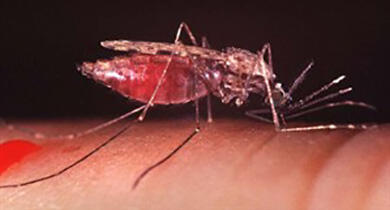
LSTM’s latest seminar examined the genetic basis of assortative mating behaviour in Anopheles gambiae, presented by Dr Frederic Tripet, Reader in Molecular Biology of Insect Vector Diseases, Centre for Applied Entomology and Parasitology, University of Keele
Dr Tripet and the Centre at Keele focus on integrative biology of arthropods, including Anopholes gambiae, the species of mosquito responsible for malaria transmission. A life-threatening and preventable disease, responsible for over 600,000 deaths each year.
By studying inter-relationships between mosquitoes and their physical and biological environments, researchers can gain a better understanding of how to control mosquito populations and in doing so reduce the burden of malaria in some of the world’s poorest communities. Although it is the female mosquito that transmits malaria, researchers are increasingly interested in the behaviour of both male and female mosquitoes and how actions such as swarming and mate choice influence breeding patterns and populations.
Male mating behaviour is a key aspect of the mosquito life-cycle and an aspect of their biology that is crucial for the development of several promising vector control strategies. In the study: Targeting male mosquito mating behaviour for vector control, Dr Tripet and co-investigators from Keele, collaborated with the Liverpool Centre for Genomic Research and the Institut de Recherche en Sciences de la Sante (IRSS), Burkina Faso.
Abdoulaye Diabaté, head of medical entomology at the IRSS centre says: “There is now a global consensus that new intervention tools are needed, and an understanding of male mating behaviour will be instrumental to their development and implementation.”
The swarm is an ideal environment for mosquito population control. Predicting swarm behaviour and how it influences the mating process is vital to understanding how to influence the molecular make-up of lab-reared mosquitoes. Researchers in the lab at Keele, are working to unlock the genes which govern mating of closely-related forms ofAnopheles gambiae, which some regard as newly-formed species. They hope to use this information to develop sterile male mosquitoes that will mate with wild females and prevent successful reproduction, leading to reduced populations of the malaria transmitting mosquito. One key question is why male mosquitoes reared in the lab have been unable to mate with females in the wild. Understanding male mating success in a swarm, is now helping to improve the mating performance of the lab-reared males.
Swarms, which can consist of up 10,000 mosquitoes are initiated by males. Females find the swarm using sound and once they have found an appropriate mate, they leave the swarm in tandem. and if they are of a compatible molecular form, mating may occur. Experiments in specially designed large outdoor cages and selected villages in the rice growing region of the Vallee du Kou Burkina Faso, where Anopheles gambiae breed in huge numbers,found that females preferred to mate with a male that had the same molecular make-up, demonstrating assortative mating. Using cross-breeding expreriments in the laboratory, the team identified a particular part of the X chromosome, referred to as a ’genomic island of speciation’, which appears to control this selectivity. Whole genome sequencing and are gene expression studies are now underway to help identifying the exact genes within the genomic island that are responsible for assortative mating.
Dr Tripet’s research is funded by the UK Medical Research Council, the Natural Environment Research Council and the UK Department for International Development.
The LSTM Seminar Series gives members of LSTM and speakers from other universities or institutions an opportunity to present their work in progress. Anyone interested in the interdisciplinary research remit of LSTM are welcome to attend. For the timetable of announcements and upcoming talks, visit LSTM’s website